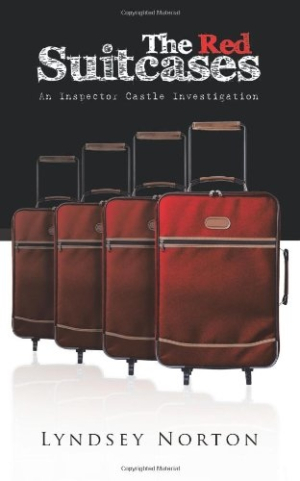The Red Suitcases
An Inspector Castle Investigation
“I could make love to you every second of every day and I would still never have enough of you.” So says Captain Robert “Bob” Castle of the British Parachute Regiment to his wife, Rebecca “Becky” Castle of the UK’s antiterrorist Special Branch, after one of their frenetic and passionate sexual encounters in The Red Suitcases. The book is the third in Lyndsey Norton’s Inspector Castle series, and the scene is one of many that could set more sedate readers to blushing from Norton’s titillating descriptions of hands up skirts, garters getting snapped, knickers being dropped, and erotic kisses being exchanged. Readers accustomed to the mainstream romance genre, however, will find Castles’ sensual meetings indispensable. After all, Bob is on leave after a tour in Iraq where a best buddy was killed, and he and Becky love each other madly despite his recurring nightmares that endanger both her and his mental stability.
Becky’s need for stress relief come from Bob’s penchant for involuntary violence and the terrorist acts of the master of “chaos and confusion,” Abdullah Razzac Fakesh, whom Becky bested in Norton’s earlier novel, Bombs on Trains. Here, he engineers a couple of near death experiences for her with four red suitcases loaded with varying types and amounts of explosives. In tracking him, Becky and her colleagues have to solve a puzzle involving several sites and individuals all named Victoria. Their failure could result in the nuclear destuction of the parliament buildings and everything connected to the royals. In between, Inspector Castle must explain her badly bruised face, and cope with a jealous wife, an accusation of an affair, and an unwanted suitor.
The UK settings for Norton’s thriller are well identified landmarks such as Heathrow and Gatwick airports, Scotland Yard, the House of Lords, and the Victoria Tower Gardens. Use of British expressions such as “bolt hole,” “gobsmacked,” “dosh,” and “shag,” are easily understood in context. A mention of the UK “7/7” bombings reinforces the authenticity of the story, as do the detailed references to diverse kinds of bomb-making materials.
However. a handful of typos mar the story’s flow. The use of the single uncapitalized word “smart,” where “Smart car” is needed for completeness of understanding, is equally jarring. Norton’s descriptions of the police procedures involving Fakesh, the tracking of the red suitcases, and the detonations at various sites are gripping, exciting, and, at times, fascinating in their detail. However, given that the novel concerns terrorism and the surveillance efforts to combat it, readers might question that Fakesh would have been able to execute his intricate final plot without being discovered in advance. It’s also a stretch to believe, as one of Becky’s colleagues proposes, that such an experienced master operative as Fakesh—“on the original ‘House of Cards’ from Iraq”—wouldn’t know about the cooperative efforts between the USA and the UK to thwart schemes such as his, no matter how clever.
Nevertheless, Norton’s novel is commendable for raising serious issues about the traumas of war and the threats of terrorism in an up-to-date context.
Reviewed by
Wayne Cunningham
Disclosure: This article is not an endorsement, but a review. The publisher of this book provided free copies of the book and paid a small fee to have their book reviewed by a professional reviewer. Foreword Reviews and Clarion Reviews make no guarantee that the publisher will receive a positive review. Foreword Magazine, Inc. is disclosing this in accordance with the Federal Trade Commission’s 16 CFR, Part 255.

